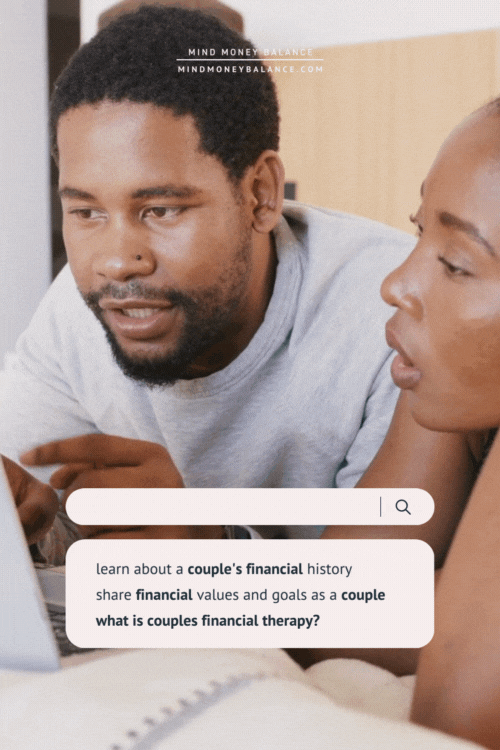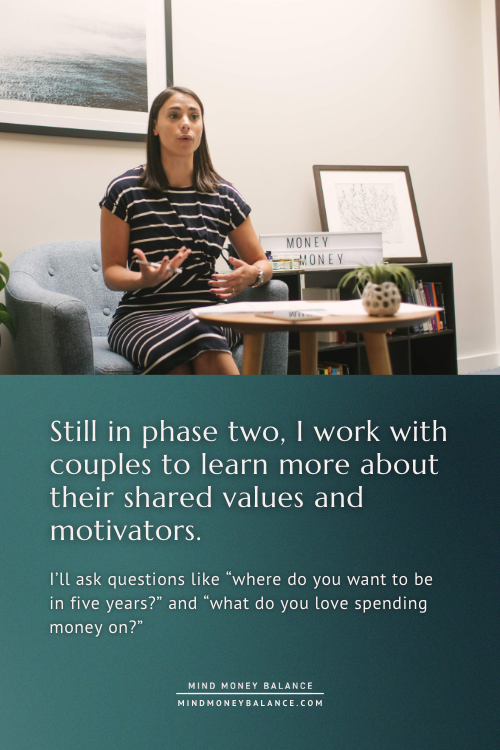What Does Couples Financial Therapy Look Like?
Couple's financial therapy, when you do it with me, looks like a three-phased approach. When working with couples in financial therapy, most people think I'm going to ask for your budget spreadsheet and proof of your net worth. Nope! I start couples therapy by first going back in time, learning more about each person's financial history, then moving toward phase two, shared values and goals, and finally ending with all the "numbers stuff." Too many people think that if they hammer out a budget, all their financial stressors will end. But as a financial therapist, I know that money is mostly psychological and emotional, and only a little bit about math.
In these individual sessions, I ask each person to complete a financial history questionnaire, covering things like "how long have these problems been going on?" and "what financial changes have you tried to make in the past?" I also ask about financial thoughts and behaviors each person endorses. These money beliefs often come from how we were raised in our families of origin (e.g., was it rude to talk about money growing up? Was money a source of stress in your family? Did you always get cash on your birthday?), what stories our spiritual leaders told us about money (e.g., are people with money chosen by G-d?, was money the 'root of all evil?'), and the way society tells us to interact with money based on our gender (e.g., are you not to be trusted with money? Or are you somehow inherently know how to earn and invest?).
After the initial sessions or intake appointments, then the three of us meet together and will continue to meet that way for our remaining financial therapy sessions. We'll continue to dig into money lessons and stories and look at how they show up in the relationship. This allows each person to see what's shaped their partner's relationship to money. I operate from the belief that everyone is doing the best they can with what they've got. And when it comes to money stuff? We are all trying to do the best we can, given most schools don't teach financial literacy, and most families don't talk about money. This means a lot of cobbled together beliefs and ideas about how to make money work. And when you take those cobbled beliefs together as a couple? It's no wonder that arguments over money continue to be one of the leading causes of divorce and separation in the United States.
These types of questions help to get couples aligned and on board with a shared money vision. In phase two, we also talk a lot about healthy communication--and miscommunication--and couples learn how to strive for collaboration instead of resorting to "I win, you lose" in arguments.
Moving into the final phase of couple's financial therapy is where the actual dollars and math come into play. In this phase, we are taking a look at what's going on on a day-to-day basis while also taking time to zoom out to ensure the couple is on track to achieve long-term financial goals. A note: as we talk about the numbers side of money, my role as a therapist is not to tell you what's "right" or "wrong." There is no one-size-fits-all when it comes to money. When we talk about the actual numbers, I offer a menu of options, and the couple decides what works best for them. Some couples like to get nitty-gritty with their money, others like a more laid-back approach. Most couples use some budgeting app for day-to-day tracking, so they don't have to track what's going on manually. This is where we talk about money dates, too. A money date is where couples sit down and talk about their money happenings in their relationship. Keeping money in a dating format helps to keep it fun and consistent. Many couples run into a problem that they only talk about money when they *have* to (e.g., one of them gets a new job opportunity, or a new member will be joining their family soon). Making money dates recurring keeps money as a part of the relationship instead of a one-off tedious task.
And there you have it! The three phases of what financial therapy for couples looks like. Starting with digging into money stories, moving into shared goals, and ending with a financial plan that is maintained as a living, breathing part of a relationship. Most of my couples work with me weekly for 4-6 months, making it a shorter therapy type than some other approaches.
Ready to get started? Click the button below to start financial therapy today.



